







 |
 |
 |
 |
 |
 |
 |
 |
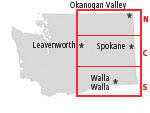 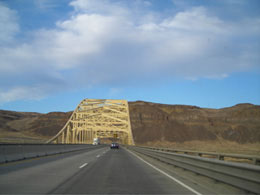
Bridge to Vantage over the
Columbia River 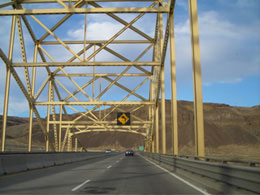 Bridge to Vantage over the Columbia River 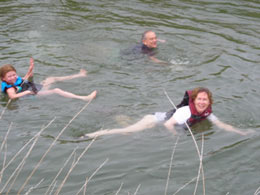
McDarra,
Robin & Marina 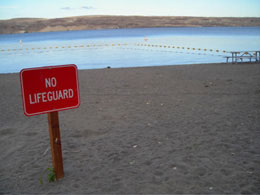 Wanapum State Park swimming beach 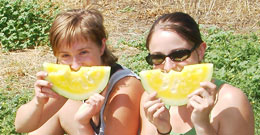 Taking
a break at Verhey’s |
Peach Picking & Black Helicopters A black helicopter swoops from the hills behind us, crossing too close overhead on its way toward the river. The helicopter has no identification that we can see and no running lights, but is momentarily caught in a searchlight that seems to be emanating from the lower section of the campground. The helicopter is illuminated from underneath which gives it an otherworldly glow. For an instant, it could be a UFO, but we know it isn’t, because we can hear the unmistakable whop of the rotor blades. The airship moves out of the searchlight’s range and continues up river, where another searchlight beam suddenly appears. Another helicopter approaches, and my sister-in-law, Donna, niece, Heidi, and I — the three of us in the “girls tent” — lurch up from our sleeping bags again to sight it through the tent’s mesh windows. The searchlight sweeps through the trees lining the river’s edge and arcs upward into the starlit sky. The light does not find this helicopter, if indeed that is its purpose. We can’t tell if there are more than the two, but we hear helicopters in the distance, up river and down, echoing in the canyons. Well, that does it. We are wide-awake. What with worrying where the hatchet is, giggling, and some ridiculous yoga demonstrations on the air mattresses, we are having a difficult time sleeping anyway. We grab our sleeping bags and go outside to watch shooting stars. And black helicopters. It is dumbfounding, really, why there would be searchlights in a campground, and why, in the middle of the night, the helicopters, which have thousands of acres of barren hills and sagebrush to maneuver across, choose to infringe upon this tiny space. We are on our annual peach-picking mission to southeastern Washington, camping overnight near Vantage, where the Columbia River spreads behind the Wanapum Dam. The former town of Vantage is underneath the water. The town now, population about 70, has a couple of places to eat, gas station, grocery store and marina. Wanapum State Park campground is south of town, a small six-acre irrigated spread hidden amidst locust and cottonwood trees. We don’t see another helicopter, but see so many shooting stars that Heidi wakes her dad, Robin, who has slept in his tent through all the excitement and doesn’t believe us when we talk about the spooky helicopters. He sees the incongruous searchlights though, and hears the distant noise. He tells us it’s just trains. The four of us lie on the grass outside our tents watching the huge sky and shooting stars until early morn, then drift to our tents for a few hours sleep. Robin gets up with the sun and swims. The females don’t. At about seven a.m. the sun makes it too warm to stay in a sleeping bag and we girls straggle out of our tent to greet the day. Our campsite faces the river, a short hike from the large lush lawn and tree shaded picnic area with its sandy swimming beach. It is stunning here on the banks of the “other” (eastern Washington) Columbia Gorge, but inhospitable. Granite cliffs and bleak undulating hills soar above the water line, spectacular against the deep blue of the river. After we pack our gear and finish discussing with camping neighbors the military invasion last night, we drive three miles up river to Vantage for pancakes and eggs before we head over the hills to our friends’ peach orchards near Royal City. Only a few miles east of the river we leave the desolate landscape and enter the Columbia Basin agriculture heaven. Thanks to irrigation, acres and acres of green—alfalfa, corn, potatoes, orchards, surrounded by desert hills. At Verhey’s farm this year, most of the peaches aren’t quite ripe which makes picking more selective. I wander the orchard testing first. The peaches are so voluptuous and beautiful against that blue sky. It does not take long to fill our boxes, wrapping each peach in newspaper to prevent bruising. We visit a while with Dan and Sheila Verhey, catching up, and then are directed to a neighboring farm where we buy peppers, tomatoes, corn, and cantaloupe picked fresh from the fields. Robin wants watermelon, so Santos, the produce farmer, drives him and Heidi down the road to pick them. Donna and I stay and visit with Santos’ beautiful barefoot five-year old daughter who tells us the sizes and names of most of her cousins. When we finish with our purchases, she comes to the car and hands us prizes — mini Musketeer candy bars — as though it were her delight to see us, instead of our pleasure to meet her. Our trip has the mandatory elements of true summer: peaches so sweet just off the tree, evenings with friends and family, peach daiquiris, burgers on the grill, hot sun, and jumping into the Columbia River. (Donna and I do not exactly jump in like Robin and Heidi, but ease in the hard way, one breathless inch at a time. Alas, my younger self could jump into any body of water without hesitation.) Yes, it is silly to drive a few hundred miles to get peaches, but it’s a tradition now. You can take a day-trip from Portland to Maryhill State Park across the river from Biggs and buy boxed peaches (and apricots and potatoes, onions, tomatoes too) at the fruit stand just off the bridge or drive down the “Peach Beach” access road parallel to the park. The park, like Wanapum, has lovely lawns, shade trees and a beach to jump into the Columbia. This is much closer and easier, but I bet the campers there have never seen a black helicopter. ADDENDUM: After the year my brother forgot the tent poles and we slept outside with no shelter under a full moon and howling wind afraid the poplars would crash and kill us and then the next year when the wind was blowing so hard we couldn’t even get the tents put up (nor could anyone else, spooky campsite, no one there except RVs) we retreated away from the river up to the Verhey’s orchard and have since camped there. Wake up with the sun heating up, crawl out of the tent and, gosh, guess I’ll have to eat, um, a peach. Then pancakes and bacon breakfast for everyone on the outdoor grill by the shed-weighing station, then picking peaches, visiting and then the annual irrigation canal float. Don’t know what was wrong with me this year — it wasn’t hot enough. Overcast and mild that day. But I did take pictures from the dike. back to Eastern Washington overview
|